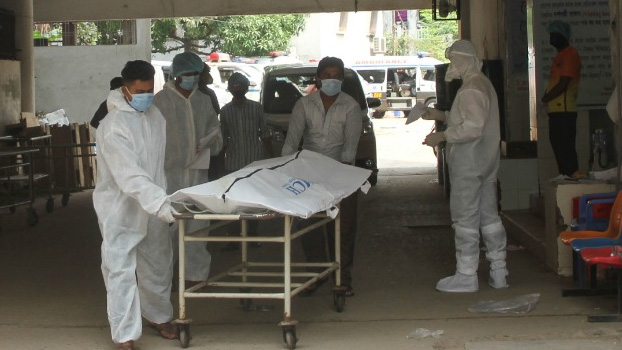No end to Covid-19 stigma

The social stigma related incidents associated with Covid-19 are on the rise in Bangladesh despite the fact that such practices hamper the response to the disease.
The Bangladesh Peace Observatory (BPO) in its weekly update said the number of reported incidents in which Covid-19 patients or patients with Covid-19 like symptoms were denied burial increased more than three-fold from June 7 to June 13 compared to the previous week.They found 14 reported cases of such denial which is associated with the social stigma.
The BPO found overall 25 incidents related to the stigma and after comparing it with the previous trend they commented that it was ‘on the rise’.
The BPO is a research facility housed at the Centre for Genocide Studies at the University of Dhaka.
It brings together different streams of publicly available data on violence, analyses and visualizes them in an interactive way for decision makers, civil society and media to understand, consume, and debate.
The WHO, Unicef and the International Federation of Red Cross (IFRC) at the beginning of the Covid19 pandemic warned countries against social stigma and fear.Evidence clearly shows that stigma and fear around communicable diseases hamper the response.
They suggest government and policymakers to build trust with ‘reliable health services and advice’, among many measures.
Bangladesh first confirmed the disease on March 8. So far, 105,535 cases have been confirmed along with 1,388 deaths.
But hospitals across Bangladesh are still not ready, leaving people to run from one center to another for basic oxygen therapy which is needed when the condition of a Covid-19 patient deteriorates.
The BPO said last week an elderly man died after suffering a seizure on the platform of Rajshahi rail station as an ambulance refused to come amid Covid-19 fears at Baolia, Rajshahi.
In another incident, locals (in-laws) resisted burial of a housewife (30) who died after suffering from dyspnea and later a day after her death she was buried at her father's house in Ranguniaupazila of Chattogram district.
For further examples of social stigma, the BPO said a son left his elderly mother (55) in front of Dhaka Medical College Hospital for two days over COVID-19 fear.Later, police recovered the victim and admitted her to the hospital’s corona unit.
A medical technologist (corona frontliner) assigned for corona sample collection was pressured into leaving his house by his landlord at Kashimpur area in Gomastapurupazila of Chapai Nawabganj district.
The report also highlighted the mental conditions related to the pandemic.For example, two Rohingya people infected with coronavirus escaped from the isolation center of UkhiyaRohingya camp which resulted in fear among the camp residents in Ukhiya, Cox's Bazar.
Again a doctor named Shairful Islam left his duty who was working in the corona ward of Pabna General Hospital. The hospital opened the corona ward on June 9 and the doctor eloped owing to fear over corona infection.
A man (TapanDutt, 45) who was a coronavirus patient committed suicide jumping off the rooftop of an under-construction building in Binodpur of RajbariSadarUpazila.When the man tested positive for the virus, he and his family members fled from their house.
The next day, health authorities visited their home in the evening and informed their neighbours that the family must return to the house by 10 pm on that day.
Later that evening, Tapan jumped off a rooftop from a three-story under-construction building. The man was sent to hospital, but doctors declared him dead.
The WHO, Unicef and IFRC earlier said such a situation can result in more severe health problems and difficulties in controlling the outbreak of a disease.
Stigma can drive people to hide the illness to avoid discrimination, prevent people from seeking health care immediately, and discourage them from adopting healthy behaviours.
What works is building trust in reliable health services and advice, showing empathy with those affected, understanding the disease itself, and adopting effective, practical measures so that people can help keep themselves and their loved ones safe, they said.
How we communicate about Covid-19 is critical in supporting people to take effective action to help combat the disease and to avoid fuelling fear and stigma.
An environment needs to be created in which the disease and its impact can be discussed and addressed openly, honestly and effectively, according to the UN agencies.
The WHO earlier in March also issued separate guidelines suggesting that dead bodies cannot spread coronavirus.
For physical distancing, WHO discourages gatherings in the funeral prayers, but advised that families can bury bodies following their respective religious rites.However,those who bathe the body are advised to wear gloves and masks.




